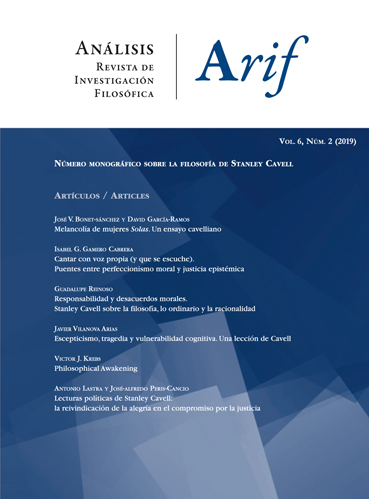Responsibility and Moral Disagreements.
Stanley Cavell on Philosophy, the Ordinary and Rationality
DOI:
https://doi.org/10.26754/ojs_arif/a.rif.201924152Abstract
The philosophy of S. Cavell begins a review of the philosophical past through the analysis of modern skepticism. This review is not intended to give an answer to the challenge, but to understand the motivations that make the skeptic deny his ordinary confidence in the world and in others with his doubts. For the North American author, what the skeptical challenge reveals is that a differentiation is established between how our concept of knowledge operates in relation to the problem of the external world and how the concept of self-knowledge operates in relation to the problem of other minds. From my point of view, this difference in turn establishes different ways of understanding the nature of disagreements.
Moral disagreements have generally been evaluated under the ideal of epistemic virtues that work for the concept of knowledge. Cavell critically reviews this ideal and interprets disagreements not as epistemic failures to overcome, but as disagreements in which participants must take responsibility for what they say without necessarily seeking a definitive agreement. This implies, from my reading, a modification in the way in which we interpret our concept of rationality.
Downloads
Downloads
Published
How to Cite
Issue
Section
License
Los autores que publican en esta revista están de acuerdo con los siguientes términos: los autores conservan los derechos de autor y garantizan a la revista el derecho de ser la primera publicación del trabajo al igual que licenciado bajo una Creative Commons Reconocimiento-No Comercial-Sin Obra Derivada 4.0 (CC BY-NC-ND) que permite a otros compartir el trabajo con un reconocimiento de la autoría del trabajo y la publicación inicial en esta revista. Los autores pueden establecer por separado acuerdos adicionales para la distribución no exclusiva de la versión de la obra publicada en la revista (por ejemplo, situarlo en un repositorio institucional o publicarlo en un libro), con un reconocimiento de su publicación inicial en esta revista.






